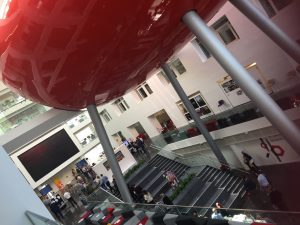 Solent University run an annual Learning and Teaching Community Conference in their inspiring ‘SPARK’ building. This year, Bournemouth University staff from HSS, FMC and Fusion Learning Innovation and Excellence collaborated and presented two research papers and a workshop. ,
Solent University run an annual Learning and Teaching Community Conference in their inspiring ‘SPARK’ building. This year, Bournemouth University staff from HSS, FMC and Fusion Learning Innovation and Excellence collaborated and presented two research papers and a workshop. ,
Find out more on twitter: #SLTCC2019
The full programme with speakers is available from here: https://www.solent.ac.uk/staff/learning-and-teaching/community-conferences/sltcc-programme
Pictured : The ‘SPARK’ building
Paper One: Developing an Assessment & Feedback Toolkit to support innovation in policy and practice.
Authors: Anne Quinney (FLIE), Ann Luce FMC), Debbie Holley (HSS), Dai Hounsell (Visiting Professor FLIE)and Vince Clark (FLIE). B
Informed by the conclusion of Ball et al (2012 p8) that assessment practice in most universities has not kept pace with other far-reaching changes in HE and that “a radical rethink of assessment practices and regulations” and a “holistic and proactive approach” is required, the Centre for Excellence in Learning (CEL) at Bournemouth University bravely took up this large-scale challenge.
Implementing this vision involved addressing both global and local dimensions of assessment in higher education (Hounsell & Zou 2017). The approach combined radical change to institution-wide assessment policy based on assessment for learning principles (Sambell 2011), and emphased partnership and collaboration in the developing the Toolkit as an Open Educational Resource. The principles-based and evidence-based strategy focused on rebalancing summative and formative assessment tasks; a broader menu of assessment types; and promoting technology-enhanced learning strategies facilitated by a new VLE. The team drew on tested leadership strategies (Quinney et al 2017) and invited large-scale engagement through internal and external events to critically inform the process, supported by the expertise of Dai Hounsell, Visiting Professor. We shared critical reflections on our approach and discuss considerations for toolkit design and construction.
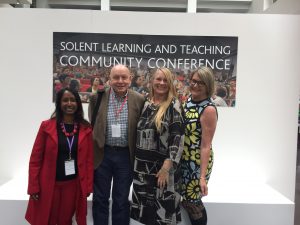
Ball et al 2012. A marked improvement: transforming assessment in higher education. York: HEA
Hounsell D and Zou T. 2017. Surfacing and sharing advances in assessment: a communities of practice approach. In: Carless C, Bridges SM, Chan CKY and Glofcheski R (eds) Scaling up assessment for learning in higher education. Singapore: Springer . pp33-48
Quinney A, Lamont C, Biggins D and Holley D. 2017. Optimising disruptive approaches: extending academic roles and identities in higher education. Journal of Learning Development in Higher Education Issue 10
Sambell K. 2011.Rethinking feedback in higher education: an assessment for learning perspective. Escalate. University of Bristol.
Above: The BU team at Solent: Dr Curie Scott,Prof Dai Hounsell, Anne Quinney and Professor Debbie Holley
Workshop: Culture Change: Signature, Technical and Showstopper challenges
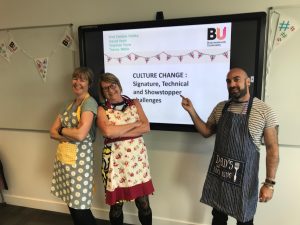
Debbie Holley, Professor of Learning Innovation, HSS, with expert Learning Technologists from FLIE: Stephen Pyne, Dave Hunt and Tracey Webb
When considering our increased reliance on technology, the OU Innovating Pedagogy Report (2019) discusses the predicted impacts of technology in the future of education, arguing that ‘The role of the teacher is overlooked, or presented as something that will in future be simulated by a machine.’ However, technology can be utilised to automate administrative tasks, implementing a learning culture that frees up staff to focus on pedagogy/ student engagement. Creating a shared understanding of the needs of 21C learners underpins the culture change work undertaken at Bournemouth University as part of our VLE implementation. This workshop offers key findings from our anonymous ‘culture change survey’, where staff feedback on a series of blended learning activities which support their transition to the new VLE. A main follow-on action was re-conceptualising the use of tools from the student perspective. By engaging with our ‘hackathon’ style workshop (loosely following the analogy of the TV ‘Great British Bake off’), participants will be encouraged to view technology tools and ideas through a different lens.
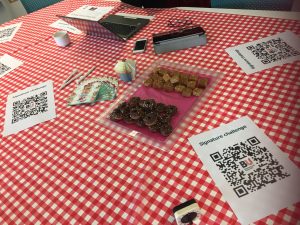
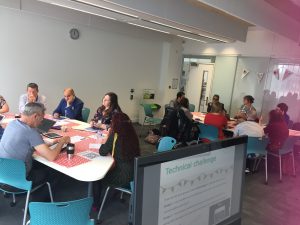
The room set up with the ‘bake-off theme’ Participants discussing their practice
Paper two: The soul of reflective practice
Curie Scott, Bournemouth University and Jo Trelfa, University of Winchester
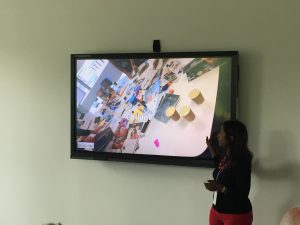
Reflective practice is central to ‘real world’ learning pedagogy. Reflective practice is integral to the theory-practice discourse in various educational settings and there is often an embedded assessed element. One common process is the use of reflective diarising or journaling to enable students to reflect on the understandings which have been implicit in their ”actions and understandings” (Schon, 1983, p61). However, it is evident that students utilise reflective schema to pass the assessment; in this way, they participate somewhat superficially in creating an appropriate artefact without deeper or even actual reflection. These shortcomings arguably mean that the soul of reflective practice is lost.
This presentation is based on a forthcoming collaborative chapter ‘Getting to the soul’:radical facilitation of ‘real world’ learning in higher education programmes through reflective practice. It draws two separate doctoral studies interested in the lived sensemaking experience of reflective practice. In this session, Jo Trelfa and Curie Scott invited the participants you to consider different forms of reflective practice.
Pictured: Dr Curie Scott illustrates how reflective practice can be enhanced through creative methods.







